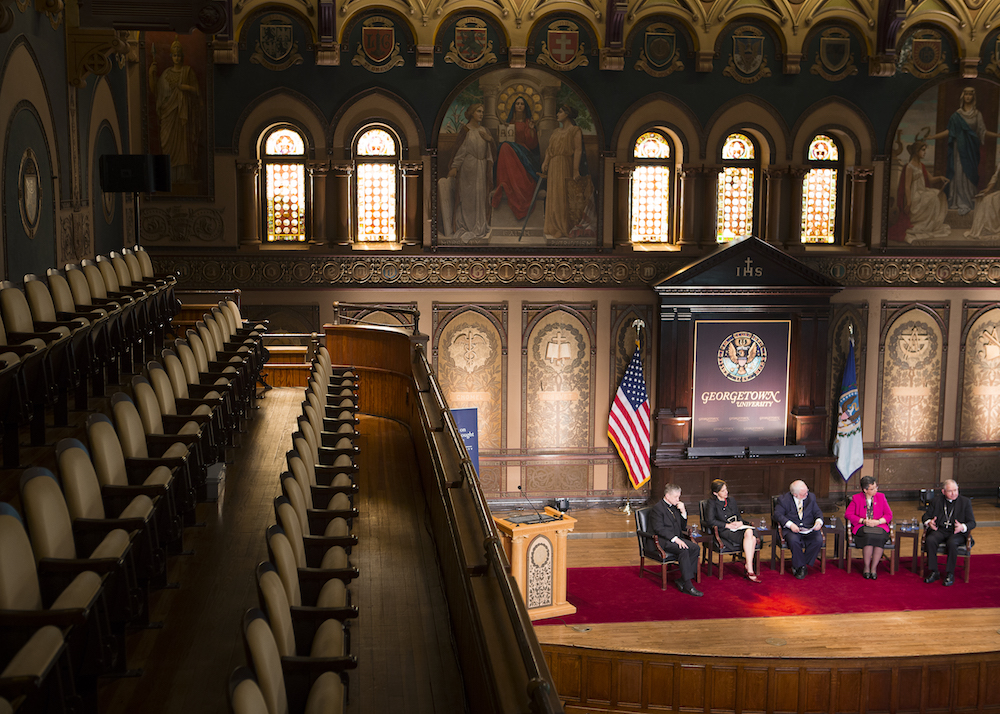A Georgetown summit’s creative approach may offer the way forward for overcoming Church tensions
It’s been 22 years since the late Cardinal Joseph Bernardin of Chicago launched the Common Ground initiative, which may well have been the most prominent effort by any senior churchman in the world to address the long-simmering ideological tensions that often run through, and fracture, Catholic life.
With more than two decades in the rearview mirror, the sad verdict almost certainly has to be that it was also a prominent failure.
If the aim was to get the Catholic left and right in America back together, it definitely flopped. Today, the progressive and conservative wings of the Church are not only far more vicious with one another than they were two decades ago, they have a much wider range of platforms upon which to spew their vitriol, thanks to social media.
Most often these days, the main thing fueling those dreary left versus right snark contests is usually Pope Francis, and whatever the latest thing is he’s said or done.
It may therefore seem counterintuitive that a June 4-6 summit at Georgetown University frequently touted Pope Francis and his vision for the Church as an antidote to polarization, since in the daily rattle and hum of Catholic debate, the pontiff can easily seem more like a cause for it, or, at least, a frequent focus for it, however undeserved.
The gathering was sponsored by my old friend John Carr and his initiative for Catholic Social Thought and Public Life at Georgetown, along with Kim Daniels, a member of the Vatican’s Secretariat for Communications.
Speakers included three of the most visible and influential Catholic leaders in America: Cardinal Donald Wuerl of Washington, Cardinal Blase Cupich of Chicago and Archbishop José H. Gomez of Los Angeles.
In effect, it was the most serious effort to address divisions in the American Church in a long time — certainly in the five-year era of Pope Francis, and arguably since Cardinal Bernardin made his famous push.
It didn’t take long for Cardinal Wuerl of Washington, with his typical lucidity, to get to the heart of the matter: In the Catholic Church, there’s a truckload of things that can be discussed — but if you want to swim in the Catholic pool, you’ve got to accept the authority of the lifeguard.
“While the name changes — Pius, John, Paul, John Paul, Benedict, Francis — it’s still Peter speaking, isn’t it?” said Wuerl.
His point, or part of it, anyway, is that “common ground” cannot involve treating any pope’s leadership as negotiable or disposable. If you want to bring people together in the Church, the road to that destination runs through getting on board with the pope.
“We inside the Church, we who are blessed to be called to that heritage, we simply have to continually recognize we have a touchstone, we have an ultimate reference point that can help us overcome whatever divergences might be,” Cardinal Wuerl said.
In what some might see as ironic, since Cardinal Cupich is often styled as a quintessential “Pope Francis” man, the cardinal from the Windy City actually cited another pope to make his point.
St. Pope John Paul II, Cardinal Cupich noted, called polarization sinful, “because it raises seemingly implacable obstacles to fulfilling God’s plan for humanity.”
For his part, Archbishop Gomez of Los Angeles delivered one of the summit’s most oft-repeated and memorable sound bites: “There is no ‘polarization’ in the communion of saints,” he said, “and there are no ‘single-issue’ saints.”
“The saints teach us that whenever human life is threatened, whenever the image of God is obscured and violated, we are called to rise up and defend it,” said Archbishop Gomez —who is, of course, known for his strong defense of the unborn as well as immigrants and refugees.
However frustrating the commonly applied political and theological perceptions of Cardinals Wuerl, Cupich and Archbishop Gomez may be, the fact they’re out there lends special significance to what happened at Georgetown this week.
It suggests that while there may be real differences in Catholic life sometimes, if you drill down, there’s still an enormous residual capacity for getting past all that and discovering the deeper things that unite people.
Chris White of Crux was at Georgetown covering the event, and he reported that many of the younger participants felt the same frustration over never-ending ecclesiastical wars of culture.
Elise Italiano, executive director of The Given Institute, talked about the damage of intra-ecclesial wars on her fellow millennials.
“For many in this room who are emerging leaders in the academy, ministry and apostolates, it’s really hard to ignore the polarizing attitudes and language that many of our mentors and guides have embraced,” she said.
“While the intra-ecclesial debates about Pope Francis, continued culture wars and fights over how exactly we’re supposed to implement Vatican II take place, our peers are being carried out in spiritual body bags in front of our eyes,” Italiano said.
I’ve been campaigning against polarization and “tribalism” in the Church for more than 20 years, and I’ve argued over and over again that Catholicism’s internal diversity is not only a strength but a huge part of what makes it such a blast.
I have no illusion that either the Georgetown event, or my own musings, will put much of a dent in the situation — too many people on both left and right are addicted to seeing others as enemies, and some of them are fairly handsomely compensated for doing so.
Nevertheless, it’s refreshing to see senior churchmen taking the lead, remarkable lay leaders such as Carr and Daniels providing the forum and younger Catholics responding. We may not be able to eliminate the snark, but perhaps we can, at least, provide a compelling alternative to it.
Interested in more? Subscribe to Angelus News to get daily articles sent to your inbox.

